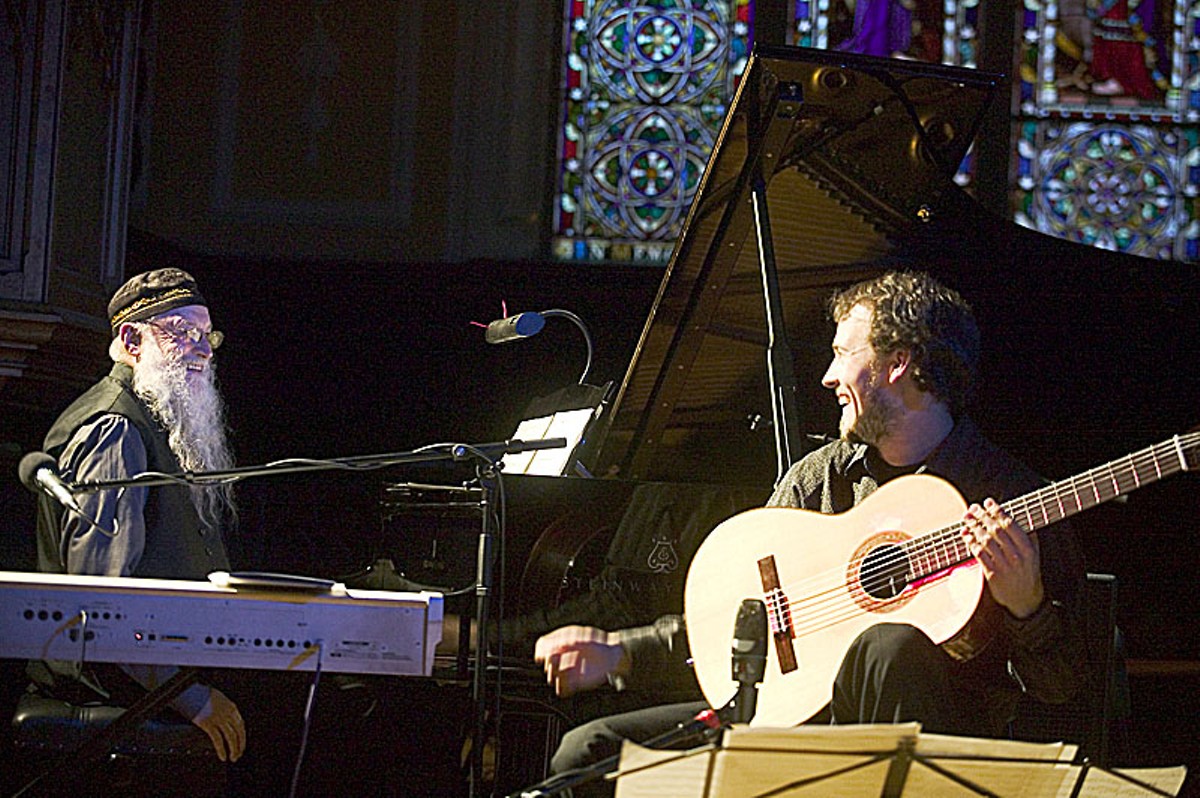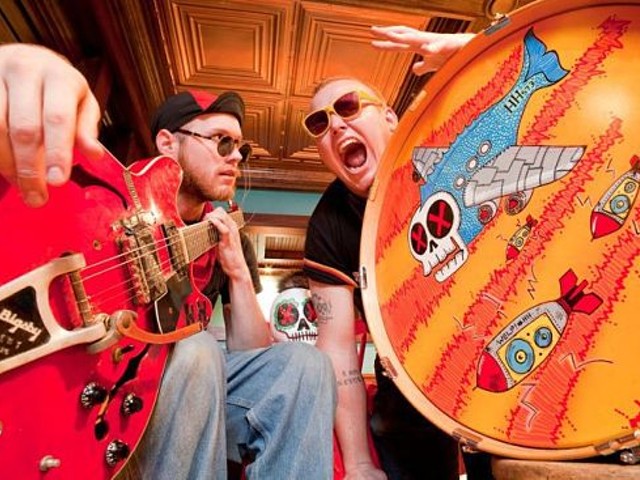In 1964, Terry Riley and a group of twelve musicians in San Francisco premiered "In C," a deceivingly simple work that uses repetition as a vehicle for spiritual transcendence. Riley constructed the piece as a series of small melodic clips and loose ground rules for the performers; the score fit on a single page, but the performance could have lasted for hours. The concert was a relatively low-key affair, especially compared to subsequent all-night performances of "In C" with more than 50 participants, but it was the birth of a slow, crawling movement that revolutionized the concept of composition.
Compared to the cold, atonal pieces his contemporaries were writing, "In C" was inclusive and joyous. It has since become one of the most performed compositions in twentieth-century classical repertoire. "'In C' was a community project," Riley says. "Nobody had any money to pay musicians, so you had to gather people who were willing to do it. The piece allows the community to relate in an interconnected way. That was a very new idea, and I think 'In C' still gives people the same opportunity. I get e-mails every day from people letting me know they're performing the piece, and I think the reason is that it has a communal excitement to it."
Riley's repetitive compositional style has been branded "minimalism." Although he views the term with some chagrin, his innovations inspired like-minded composers Philip Glass, Steve Reich (who played piano at the "In C" debut) and non-classical artists such as Brian Eno, Sufjan Stevens, Aphex Twin, Tortoise, as well as countless others. Some consider minimalism to be robotic and rigid, but Terry Riley maintains an organic atmosphere by blurring the lines of composition and improvisation.
Riley continues exploring this gray area with sporadic duets with guitarist Gyan Riley, his son and one of his favorite collaborators. The duo appears at the Sheldon Concert Hall on September 17.
"Everybody I work with is usually very good at improvisation and has some kind of mutual background in Indian classical or jazz or classical or world music," he says. "But Gyan is one of the most intuitive musicians I've ever worked with." This is an impressive statement; Terry Riley's long list of co-conspirators includes John Cale of the Velvet Underground and modern classical juggernaut Kronos Quartet.
Not surprisingly, the feeling is mutual for Gyan Riley. "We know each other so well that there's a certain element of instinct and connection that is different than I have with other people," he says.
Gyan grew up surrounded by eclectic music; Terry recalls playing an Indian harmonium while his son sat on the floor beating on a hand drum. He began to comprehend the impact of his father's music at an early age. "We were always going to concerts when I was a kid," Gyan says. "I remember going to a Kronos Quartet concert of my dad's music when I was really little and thinking, 'Gosh, there are a lot of people here.' Afterwards, we went to a reception with chandeliers and Champagne and fancy food, and I think I fell asleep under a table because it was late, but I knew this was a big deal."
At age twelve, Gyan won a cheap nylon-string guitar in a raffle and learned riffs from Dead Kennedys and Iron Maiden songs before focusing on classical techniques. The father-and-son combo first played together when Gyan was seventeen. "[Terry] was rehearsing with a group, and I was sitting on the steps leading up to his studio, and I didn't think he could see me," Gyan recalls. "I was hearing this sort of complex music and trying to figure out the timing. Once I settled into it, my dad caught me grooving to the beat and said, 'Why don't you get your guitar and come join us?'
"It's funny looking back that we hadn't done any serious playing together before that point," Gyan continues. "But I also was still trying to figure out what I was doing with music, and I remember very specifically when he asked me to join him. It was really exciting."
Name recognition kicked in when Gyan Riley attended the San Francisco Conservatory in 1995; by then, Terry Riley's compositional techniques had been infiltrating popular music for a quarter of a century. The Who emulated the squirming synthesizers of his 1969 album A Rainbow in Curved Air on "Won't Get Fooled Again" and the aptly titled "Baba O'Riley." Sonic Youth approached Riley's minimalism via punk, and decade-defining albums like David Bowie's Low and My Bloody Valentine's Loveless are direct descendents of his sonic adventures.
"There was definitely a period where always being referred to as the son of Terry Riley was a double-edged sword," Gyan says. "There were certain opportunities that presented themselves because of it, but people had an expectation that I'd do certain things, that I'd go up and play 'In C' on guitar. I don't feel that anymore; now when we play together, we influence each other, and I'm not just learning how to play his music. I had to figure out what I was doing by myself first. Now I just don't give a shit what anyone thinks, but it's hard to get to that point."
Terry Riley's shadow might be daunting, but his influence on modern music is immeasurable. Electronic musician Dan Deacon frequently name-drops him as an influence, as does experimental monolith Animal Collective. When the latter group curated an edition of the All Tomorrow's Parties festival, it selected Terry Riley as a performer. The event was a significant opportunity to appeal to an audience outside of his normal niche, and he chose to perform alongside his son.
"The indie-classical and indie-rock fields are very close together," Terry says. "I enjoy the opportunity because I get to play different venues to a new audience. It's very lively, and I like the musicians I meet and what they're doing. And when it's Gyan and I, he usually plays electric guitar, and I play synthesizer, so it's more of a plugged-in thing."
The Rileys will be in quieter form at the Sheldon, with Gyan on classical guitar and Terry on piano and vocals. The pair released a collection in 2011 of live duets, which gave insight to both musicians' unique takes on Indian ragas, Spanish flamenco and American jazz. They plan on recording soon for John Zorn's Tzadik label but are not currently touring or promoting an album. This performance is a matter of convenience; the duo plays in New York the Friday before, and St. Louis is a relative midway point between Gyan's base in Brooklyn and Terry's home in Northern California.
Besides the instrumentation, the specific program is unknown. Tasked with explaining whether the pair will perform compositions or simply improvise, Terry Riley uses noncommittal words like "probably" and "most likely" while searching for an answer. The correct response is probably, most likely, "both."
This loose atmosphere is typical for the Rileys. "Usually we don't have a chance to get together beforehand to play," Terry says. "It's kind of like winging it. When we play together I feel very synchronized. We both often reach for the same ideas at the same time. There are probably genetics in play, but it's also a spiritual experience for me."
"It's interesting, because you'd think our experience with each other would translate into knowing what the other person is going to do onstage," Gyan says. "But my dad is incredibly spontaneous, so we might talk about doing a piece and then totally not do it at all. And even though I might know a piece of his that we're playing, he'll often take it in a different direction unannounced. So we know each other very well, and there's a certain level of intuition that always comes into play, but it's always unpredictable. He keeps me on my toes."
Gyan then laughs mischievously, the giggle of a son aiming a defiant gesture at his father, and says, "Of course, I try to keep him on his toes, too."






